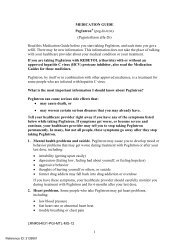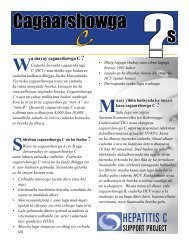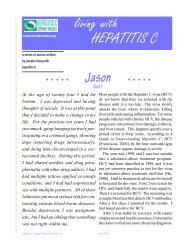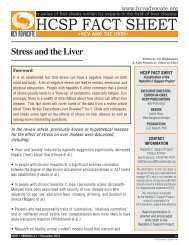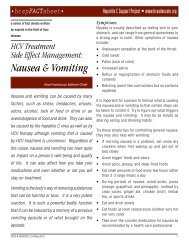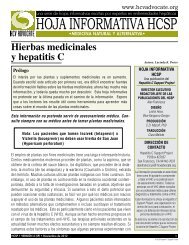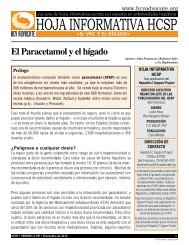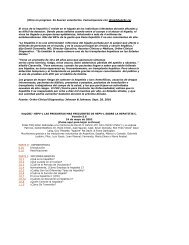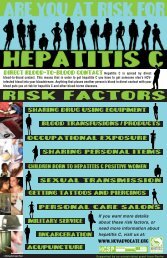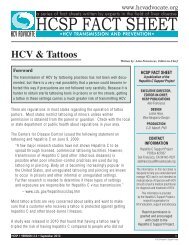Pruritus (Itching) - HCV Advocate
Pruritus (Itching) - HCV Advocate
Pruritus (Itching) - HCV Advocate
Create successful ePaper yourself
Turn your PDF publications into a flip-book with our unique Google optimized e-Paper software.
hepatotoxicity. Butorphanol has also been shown to<br />
be effective in suppressing cholestatic pruritus. Zoloft<br />
(Sertraline), an antidepressant often prescribed to people<br />
with hepatitis C, is also effective in reducing the itching<br />
caused by cholestatis.<br />
Another way to reduce itching is to stop smoking if you do<br />
smoke tobacco. Not only does smoking possibly affect the<br />
sustained virological response to interferon (IFN) therapy,<br />
but it can also lead to “Smoker’s Syndrome,” which is<br />
characterized by episodes of facial flushing, warmth of the<br />
palms and soles of feet, throbbing headache, fullness in<br />
the head, dizziness, lethargy, prickling sensation, pruritus<br />
and arthralgia (joint pain).<br />
Experimental treatments for pruritus include plasmapheresis<br />
(in which blood plasma is removed, filtered, and<br />
returned to the body) and ultraviolet (UV) light therapy.<br />
Liver transplant is the only cure for severe itching in<br />
people with advanced liver disease. For most people<br />
with less advanced hepatitis C, though, practical measures<br />
and medications are often sufficient to overcome<br />
the itch.<br />
Tips for combating dry skin and itching:<br />
♦♦<br />
Avoid soap. Use a non-soap cleanser such as<br />
Cetaphil or a similar substitute<br />
♦♦<br />
Try rubbing, vibration, or applying pressure instead<br />
of scratching. A good thing to “scratch” with is an<br />
ice cube<br />
♦♦<br />
Drink plenty of water or other clear fluids to keep your<br />
entire body hydrated<br />
♦♦<br />
Apply moisturizer immediately after a shower or bath<br />
– before drying off with a towel<br />
♦♦<br />
Creams are more effective moisturizers than lotions<br />
♦♦<br />
Apply moisturizer at least twice a day. Effective<br />
moisturizers include Vaseline Intensive Care, Aveeno,<br />
Eucerin, and Lubriderm<br />
♦♦<br />
Use only non-perfumed, mild bath and personal care<br />
products<br />
♦♦<br />
Avoid extremely hot showers and baths<br />
♦♦<br />
Take an oatmeal bath to relieve itching and help with<br />
relaxation<br />
HCSP • VERSION 2.2 • June 2010<br />
♦♦<br />
Try baking soda or unscented bath oils for bathing<br />
♦♦<br />
Apply cold packs (wrapped in a towel) to the skin<br />
♦♦<br />
Whenever possible, wear loose fitting clothes made<br />
from natural fabrics that breathe<br />
♦♦<br />
Protect your skin from the sun – wear sunscreen<br />
♦♦<br />
Look after your lips – use lip balm with sunscreen<br />
♦♦<br />
Get plenty of rest<br />
♦♦<br />
Keep rooms ventilated and at a temperature of 60<br />
to 70 degrees<br />
References<br />
Portions of information appearing in this article are excerpts<br />
written by Liz Highleyman (“<strong>Pruritus</strong>: Dealing with<br />
that Itch,” <strong>HCV</strong> <strong>Advocate</strong>, March 2003), and Lucinda Porter<br />
and Alan Francicus (A Guide to Hepatitis C Treatment<br />
Side Effect Management, HCSP Publications, 2009).<br />
*Soylu S, Gül U, Kiliç A. Cutaneous manifestations in patients<br />
positive for anti-hepatitis C virus antibodies. Acta<br />
Derm Venereol. 2007;87(1):49-53<br />
See also: <strong>Pruritus</strong> and Systemic Disease, by David F<br />
Butler, MD, and Jared J Lund, MD. http://emedicine.<br />
medscape.com/article/1098029-overview<br />
For more information about hepatitis C, hepatitis B and<br />
<strong>HCV</strong> coinfections, please visit www.hcvadvocate.org.<br />
Executive Director<br />
Editor-in-Chief, HCSP Publications<br />
Alan Franciscus<br />
Design<br />
Paula Fener<br />
•hcspFACTsheet•<br />
A publication of the Hepatitis C Support Project<br />
Production<br />
C.D. Mazoff, PhD<br />
Contact information:<br />
Hepatitis C Support Project<br />
PO Box 427037<br />
San Francisco, CA 94142-7037<br />
alanfranciscus@hcvadvocate.org<br />
The information in this fact sheet is<br />
designed to help you understand and<br />
manage <strong>HCV</strong> and is not intended as<br />
medical advice. All persons with <strong>HCV</strong><br />
should consult a medical practitioner for<br />
diagnosis and treatment of <strong>HCV</strong>.<br />
This information is provided by the<br />
Hepatitis C Support Project • a nonprofit<br />
organization for <strong>HCV</strong> education, support<br />
and advocacy • © 2010 Hepatitis C<br />
Support Project • Reprint permission is<br />
granted and encouraged with credit to<br />
the Hepatitis C Support Project.<br />
2



